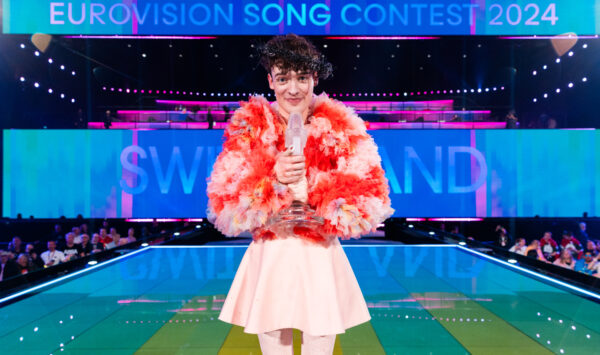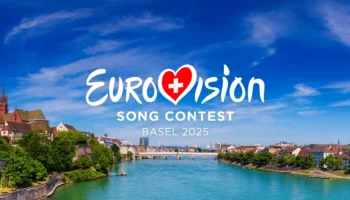The EBU (European Broadcasting Union) has released data and further details regarding the 2024 Eurovision Song Contest, the Malmo held contest has broken a number of new records and has been watched by a whopping 163 viewers across the three live televised shows.
This year’s Eurovision edition saw a growth of 1 million viewers in comparison to last year’s edition in Liverpool, and a 2 million viewers growth in comparison to the 2022 Eurovision edition in Turin.
The viewing share of the Grand Final saw an amazing 46.7% viewing share, the highest since the 2006 Eurovision edition in Athens. Several new records were broken globally and in the competing countries at Eurovision 2024.
The EBU’s press release reads:
The 68th Eurovision Song Contest (ESC), hosted by Sveriges Television (SVT) in Malmö, brought audiences around the world together on both linear and online platforms.
The Eurovision Song Contest 2024, organized by the European Broadcasting Union (EBU), reached 163 million people over the 3 live shows across 37 public service media markets.*
The total reach of the Contest increased by 1 million people compared to 2023 and has grown by 2 million since 2022’s Contest in Turin.
The viewing share of the Grand Final was 46.7% – the highest share since 2006 and almost triple the broadcast channels average (17.6%).
Among Youth audiences (15-24 year olds), the viewing share of the Grand Final was 58.6%, the highest share on record and more than 4 times the broadcast channels average (13.7%).
Host country Sweden achieved a similar audience to last year’s edition, with 2.3 million viewers tuning in for the Grand Final.. With 87.3%, their viewing share is the highest recorded for the Eurovision Song Contest since 2000.
Switzerland, who won the Contest for the third time, achieved an average audience of 723,000 viewers across the three linguistic regions, up 40% on 2023. In the three regions, the viewing share was the highest ever recorded.
Germany recorded the highest audience for the Grand Final with an average of 8.1 million viewers watching on Das Erste and ONE. The United Kingdom had the second highest audience with 7.7 million viewers tuning in for the Grand Final on BBC One.
France achieved an audience of 5.4 million viewers, an increase of 1.9 million compared to last year’s edition.
In close to half of the markets (18 out of 37), the ESC claimed over 50% of the viewing share, led by Iceland with 96% and closely followed by other Nordic markets (Sweden 87.3%, Norway 85.5% and Finland 83.1%), Croatia (73.2%) and Lithuania (70.2%).
2nd placed Croatia, who gained their best ever result in the Contest, achieved their highest ESC audience and viewing share on record since 2006, with 1.1 million viewers and 73.2%, respectively.
During the week of the event, 7.3 million unique viewers watched the live shows on the Official ESC YouTube channel, either as they happene150d or on replay.
Concurrent views of the Grand Final on YouTube peaked at 1.6m, 17.8% more than Liverpool 2023, with record online views of the First and Second Semi-Finals too; nearly 35% of online viewers were aged between 13 and 24.
Viewers from 156 countries cast their votes
The EBU’s press release continues to read:
This year public voting was open before the 3 live shows in non-participating countries and throughout the performances in the Grand Final resulting in viewers from 156 countries casting votes for their favourite songs – 12 more than when Rest of the World voting was introduced in 2023.
Outside the participating countries, viewers in the USA, Canada, Romania, Mexico, UAE, Türkiye, South Africa, Hungary, Slovakia and Bulgaria cast the most votes online.
Massive Surge in Online Engagement
Online the Eurovision Song Contest’s digital platforms had another record year.**
486 million unique accounts were reached on TikTok, the ESC’s Official Entertainment Partner, during the event weeks, more than 4 times as many as in 2023.
TikTok also saw a total of 538 million videos views on the official Eurovision account – up 71% year-on-year.
Videos on the platform using #Eurovision2024 have been watched 6.5 billion times – up 1.7 billion on last year’s hashtag.
69 million unique accounts were reached on Instagram – more than twice as many as in 2023.
Videos on the platform were seen 479 million times, 165% up on last year while content on the ESC Facebook page was seen by 23 million during the two event weeks.
42 million unique viewers across 231 countries and territories watched content on the official YouTube channel during the week of the Live Shows.
The Reddit r/eurovision community grew 71.8% in screen views and 27.8% in engagement year-on-year, as users followed rehearsals live and put their questions directly to artists in AMA (Ask Me Anything) interviews.
Additionally, 2.5 million people used the new Eurovision Song Contest app.
Statements from the EBU and SVT Officials
Jean Philip De Tender (EBU Deputy Director General) says:
These incredible numbers show the Eurovision Song Contest’s huge global impact – online, on TV and importantly musically. We’re thrilled to see a growth in the hundreds of millions tuning in to the live shows on EBU Member channels and record-breaking numbers engaging with the songs and artists on our different digital platforms. Our thanks go to SVT who produced over 9 hours of world leading entertainment shows, harnessing the power of public service media to reach audiences around the world.
Ebba Adielsson (SVT/ Eurovision 2024 Executive Producer) says:
I am so proud of our team, who worked with such dedication and passion towards the goal of delivering three fantastic shows for the Eurovision Song Contest 2024. The hosts, Petra Mede and Malin Åkerman, the participating artists, the interval acts and our set and lighting design – we believe it all came together with huge success and took the Eurovision Song Contest to the next level. It is a breathtaking thought that 163 million viewers watched the shows and that people from over 150 countries were engaged in voting, United By Music.
The Great Impact
The EBU’s press release goes to mention about the wider impact of the competition:
Early data and figures from the Host City, Malmö, suggests that 82,000 visitors came to the Eurovision Village during the week of the event.
Fans from 92 countries bought tickets to 9 shows during the event week which included Dress Rehearsals and live broadcasts.
Around 1,100 journalists from at least 54 countries were accredited to cover the event onsite.
The 2024 Eurovision Song Contest was broadcast live in the 37 competing countries, Montenegro, Kosovo, North Montenegro, USA, Peru, Chile and Brazil.
The 2024 Eurovision Song Contest was held on 7, 9 and 11 May at the Malmo Arena, in Malmo, Sweden.
Source: EBU
Photo credit: EBU / Corinne Cumming




